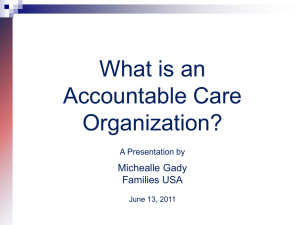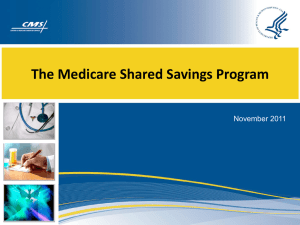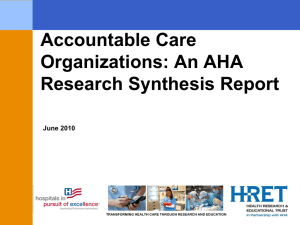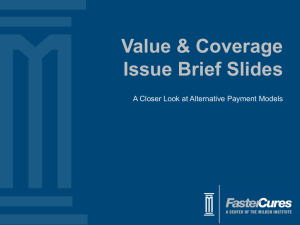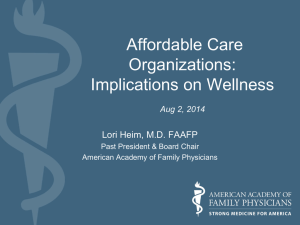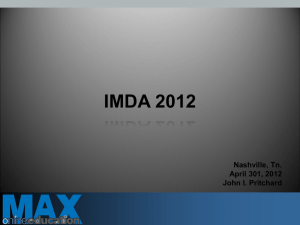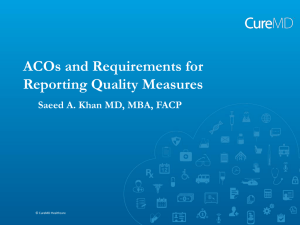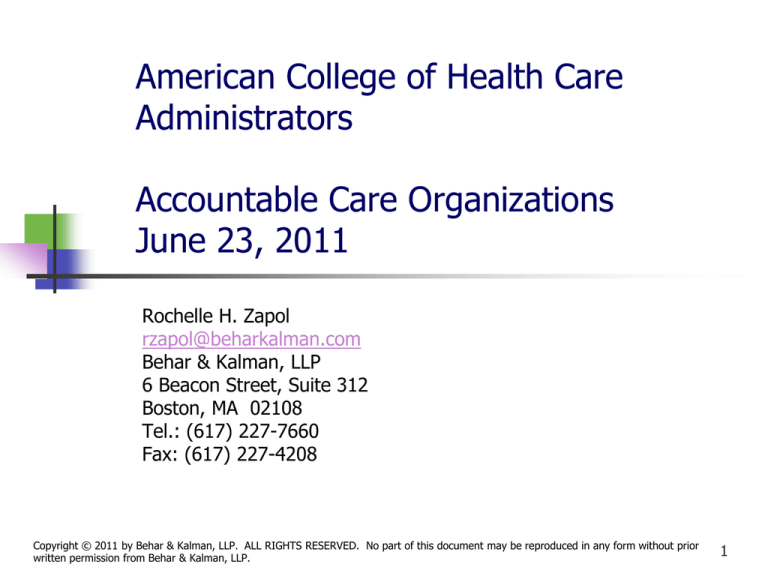
American College of Health Care
Administrators
Accountable Care Organizations
June 23, 2011
Rochelle H. Zapol
rzapol@beharkalman.com
Behar & Kalman, LLP
6 Beacon Street, Suite 312
Boston, MA 02108
Tel.: (617) 227-7660
Fax: (617) 227-4208
Copyright © 2011 by Behar & Kalman, LLP. ALL RIGHTS RESERVED. No part of this document may be reproduced in any form without prior
written permission from Behar & Kalman, LLP.
1
Statutory Authority for Proposed Federal
Regulations on Accountable Care Organizations
(ACOs)
The statutory authority for ACOs is derived from Section
3022 of the Patient Protection and Affordable Care Act of
2010 (“PPACA”) which established a Medicare Shared
Savings Program to:
promote accountability for a patient population
coordinate items and services for Medicare Part A and Medicare
Part B
encourage investment in infrastructures and redesigned care
processes to provide high quality and efficient services
The Medicare Shared Savings Program is required to be
established by January 1, 2012
Behar & Kalman, LLP
2
Proposed Federal Regulations on
ACOs
Centers for Medicare and Medicaid Services (CMS) issued proposed
regulations on ACOs at 76 Fed. Reg. 19528 et seq. (April 7, 2011)
CMS and the Office of the Inspector General (OIG) jointly issued
proposed regulations at 76 Fed. Reg. 19655 et seq. (April 7, 2011)
Federal Trade Commission (FTC) issued a proposed statement on
Antitrust Enforcement on April 7, 2011 at 76 Fed. Reg. 21894 et
seq. (April 19, 2011)
Internal Revenue Service issued a notice and request for comments
related to tax exempt organizations
Comment period on the proposed regulations ended on June 6,
2011
Comment period on the proposed statement ended on May 31, 2011
Behar & Kalman, LLP
3
ACO Coverage
Proposed federal regulations on ACOs
apply to services provided to Medicare
beneficiaries only
Services provided to Medicaid recipients
and private pay patients are excluded
Medicare beneficiaries enrolled in
Medicare Advantage Plans are also
excluded
Behar & Kalman, LLP
4
Purpose of ACOs
Purpose of ACOs is to create incentives for providers to
collaborate to treat patients across health care settings
Payment will be made on a fee for service basis
Health care providers and suppliers including skilled nursing
facilities (SNFs) will be able to participate in shared savings
under the Medicare Shared Savings Program
CMS’ median estimate of the financial impact of the Medicare
Shared Savings Program for calendar years 2012 through
2014 is a net savings of $510 million
PricewaterhouseCoopers’ analysis: CMS’ savings estimates are
off due to high start-up costs
What about cost of implementing electronic records for
providers which are not entitled to incentive payments?
Behar & Kalman, LLP
5
Eligibility Criteria for Forming
ACOs
Under PPACA, ACOs may be formed by:
ACO professionals (physicians and practitioners) in group
practice arrangements
Networks of individual practices of ACO professionals
Partnerships or joint venture arrangements between acute
care hospitals and ACO professionals
Acute care hospitals employing ACO professionals
CMS roughly estimates that the total average start-up
investment and the first year of operating expenses
for an entity forming an ACO to participate in the
Medicare Shared Savings Program would be
approximately $1.7 million
Behar & Kalman, LLP
6
Participation in ACOs
SNFs, long-term care hospitals, and
federally qualified health centers may
not form ACOs, but may participate in
established ACOs
Participation in ACOs is voluntary
Behar & Kalman, LLP
7
Legal and Governing Structure of
ACOs
ACOs are required to have a formal legal
structure that allows them to receive and
distribute shared savings to participating
providers and suppliers
ACOs are required to have authority to
conduct business under State law
Hospitals that employ ACO professionals
would be allowed to participate in the
Medicare Shared Savings Program under their
current legal structure
Behar & Kalman, LLP
8
Shared Governance
Proposed rule provides for “a mechanism of shared
governance that provides all ACO participants with
an appropriate proportionate control over the ACO’s
decision making process”
The governing body, e.g., a board of directors or a
board of managers, is required to include
representatives from ACO providers and suppliers as
well as Medicare beneficiaries
ACO participants are required to control at least 75%
of the governing body
SNFs which participate in ACOs will have the
opportunity to share in the governance
Behar & Kalman, LLP
9
Beneficiary Assignment to ACOs
Beneficiaries are assigned to an ACO based on primary care services
rendered by physicians in general practice, internal medicine, and
geriatric medicine
Under PPACA, an ACO is required to have at least 5,000
beneficiaries assigned to it to qualify to participate in shared savings
Assignment is made on a retrospective basis
Beneficiaries do not enroll in a specific ACO and ACOs do not know
which beneficiaries are assigned to it until the end of the year
Two reasons CMS proposed retrospective assignment of
beneficiaries:
“… the ACO should be evaluated on the quality and cost of care
furnished to those beneficiaries who actually chose to receive care from
ACO participants during the course of the performance year.”
“… to encourage the ACO to redesign its care processes for all Medicare
FFS [Fee for Service] beneficiaries, not just for the subset of
beneficiaries for whom the ACO is being evaluated.”
Behar & Kalman, LLP
10
Medicare Beneficiaries’ Freedom
of Choice
The assignment of a patient to an ACO
in no way restricts a Medicare FFS
patient’s freedom of choice in selecting
physicians and other health care
providers and suppliers from whom
he/she wishes to receive services
Behar & Kalman, LLP
11
Notice to Medicare Beneficiaries
ACO is required to provide written notice to Medicare
beneficiaries that:
(1) ACO providers/suppliers are participating in an ACO;
(2) ACO may request claims data on the beneficiary;
(3) the beneficiary may “opt-in” or “opt-out” to sharing his/her
claims data information;
(4) ACO is no longer participating in the Shared Savings Program
if it is terminated from or terminates its Agreement to
participate;
(5) All beneficiary communications and materials used by ACO or
its providers/suppliers to communicate about the ACO require
prior CMS approval.
It is up to the beneficiary to elect to receive services
from the provider/supplier or another provider/supplier
that is not part of the ACO.
Behar & Kalman, LLP
12
Payment Model – Shared Savings
CMS will develop a performance benchmark for ACOs to
assess whether they qualify for shared savings
ACOs will receive a share of any savings if the actual per
capita expenditures of their assigned Medicare
beneficiaries are below the benchmark
ACOs will select either:
A one-sided risk payment model (sharing of savings only for the
first two years, and sharing of savings and losses in the third
year); or
A two-sided risk payment model (sharing of savings and losses
for all three years)
CMS has no authority to specify how shared savings will
be distributed by ACOs
Behar & Kalman, LLP
13
Payment Model – Shared Losses
Proposed methodology for determining
shared losses is based on the ACO’s quality
performance score
Proposed shared loss cap of 5% of the
benchmark in the first year, 7.5% in the
second year, and 10% in the third year
Behar & Kalman, LLP
14
Quality Measures and
Performance Thresholds
65 quality measures are proposed for the first
year (January 1, 2012 through December 31,
2012) in the following 5 areas:
(1)
(2)
(3)
(4)
(5)
Patient/Caregiver Experience of Care
Care Coordination
Patient Safety
Preventative Health
At-Risk Population/Frail Elderly Health
ACOs which do not meet quality performance
thresholds for all proposed measures would
be ineligible for shared savings
Behar & Kalman, LLP
15
ACOs Contract with the Department
of Health and Human Services
ACOs would enter into agreements with
the Department of Health and Human
Services for a period of not less than 3
years
Behar & Kalman, LLP
16
Fraud and Abuse Waivers
CMS and the OIG have jointly proposed waivers
of the following fraud and abuse laws:
Stark self referral regulations which prohibits
physicians from making referrals for Medicare
“designated health services”
Anti-kickback statute which imposes criminal penalties
for inducing or rewarding referrals of business
reimbursable under any federal health care program
Civil monetary penalties which prohibit hospital
payments to physicians to reduce or limit services to
Medicare/Medicaid beneficiaries under their care
Behar & Kalman, LLP
17
Commonwealth of Massachusetts
Proposed Legislation on ACOs
Introduced by the Governor on February 17, 2011
Purpose is to improve quality of health care and control costs
Establishes integrated care organizations, i.e., ACOs, comprised
of integrated or connected groups of health care providers to
achieve improved health outcomes and lower health care costs
A “health care provider” is defined to include “a provider of
medical or health services and any other person or organization,
including an ACO, that furnishes, bills, or is paid for health care
service delivery within the normal course of business.”
Nursing homes are included within the definition of health care
provider
ACOs cover all public, e.g., Medicare and Medicaid, and private
payors
Behar & Kalman, LLP
18
Participation in ACOs
Primary care clinicians such as
physicians are allowed to participate in
only one ACO, except if the Division of
Health Care Finance and Policy (DHCFP)
provides otherwise
Other clinicians and health care
providers are allowed to participate in
more than one ACO
Behar & Kalman, LLP
19
Alternative Payment Methodologies
Goal is to establish alternative payment
methodologies to fee for service payments for all
health insurers such as:
Global payments with limits on financial risks, partial global
payments, and gainsharing with pay for performance
Practice expense capitation with gainsharing, care
management payments
Bundled payments, episode-based payments, pay for
performance
Shared savings
Payors may include additional payments for services
provided in addition to integrated services such as:
home health
chronic/rehabilitation services
Behar & Kalman, LLP
20
Role of the Division of Health
Care Finance and Policy
The DHCFP is charged with monitoring health
care expenditures across the Commonwealth
and issuing regulations to:
Establish benchmarks for expanding the use
of alternative payment methods
Reduce fee for service methods
Lower annual increases in total medical
expenditures
Complete above 3 tasks by the end of 2015
Behar & Kalman, LLP
21
Role of the Division of Health
Care Finance and Policy, cont.
Establish standards for alternative payment methods to be used in contracts
between payors and ACOs and other providers
Establish requirements for disclosure to the DHCFP of ACO costs and
payments made to ACOs by payors
Require payors to submit documentation to the DHCFP annually to
demonstrate rates of payment under contracts with providers and ACOs
expect to result in spending within the relative cost containment benchmarks
and growth rates established by the DHCFP
Monitor ACO provider and payor compliance with regulations governing
ACOs, achievement of benchmarks, and cost growth trends
Hold hearings to determine appropriate cost growth and other benchmarks
Waive requirements to allow/support demonstration or pilot programs for
monitoring savings or improvements in delivery and quality of care
Behar & Kalman, LLP
22
Basic Requirements for ACOs
ACOs are required to:
Operate as a single integrated organization that
accepts shared responsibility for the cost and quality
of care provided to a specific population of patients
cared for by the groups’ clinicians
Operate consistently with principles of a patientcentered medical home and other requirements of
State legislation on ACOs
Have a formal legal structure to receive and distribute
savings
Comply with federal requirements related to ACOs
Behar & Kalman, LLP
23
Functional Requirements for
ACOs
At a minimum, ACOs are required to have or provide
through contractual arrangements:
Clinical service coordination, management, and delivery functions
Population management functions, including Health Information
Technology (HIT)
Financial management capabilities
Contract management capabilities
Quality measures to report on performance
There is a performance penalty if ACO fails to achieve certain quality
measures
Patient and provider communication functions
Ability to provide behavioral health services within ACO or by
contractual arrangements
Behar & Kalman, LLP
24
Patient Protections
ACOs are required to ensure access by disabled
individuals and other individuals with chronic or complex
medical conditions to appropriate specialty care
ACOs are required to accept all patients regardless of
payor or clinical profile
The Office of Patient Protection is directed to establish
regulations relating to consumer appeals of ACO
determinations
The DHCFP is required to:
Safeguard against underutilization of services and inappropriate
denials of services or treatment
Safeguard against, and impose penalties for, inappropriate
selection of low cost patients and avoidance of high cost patients
by ACOs and ACO network providers
Behar & Kalman, LLP
25
Federal Waivers
The Executive Office of Health and Human Services is
charged with obtaining any federal waivers needed to
allow Medicare to participate in the Commonwealth’s
alternative payment methods
By August 6, 2011 federal waivers must be requested for:
safe harbors or the expansion of safe harbors to permit risk
sharing agreements
Stark self referral regulations which prohibits physicians from
making referrals for Medicare “designated health services”
Behar & Kalman, LLP
26
Potential Issues for SNFs/NFs
Waivers
Waivers of certain federal and state requirements
applicable to SNFs/NFs that go beyond those in
the federal and state ACO initiatives would be
needed such as:
the Medicare requirement set forth in 42 U.S.C.
§1395x(i) that an admission to a SNF be preceded by a
3-day hospital stay (or at the very least, a waiver of
the requirement that observation days be omitted
when counting the 3-day hospital stay)
Allows SNFs/NFs more flexibility in admitting residents who
would benefit from their programs of care
Behar & Kalman, LLP
27
The Attorney General’s requirement set
forth in 940 CMR 4.09(4) which limits the
ability of a licensed nursing home to
transfer a resident to different living
quarters, contrary to the resident’s wishes,
except to meet the resident’s health care
needs which otherwise could not be met
Allows SNFs/NFs more flexibility to admit
residents to specialized units
28
Potential Issues for SNFs/NFs
Electronic Health Records
To achieve efficiencies and improve quality of care, it will be essential
for ACOs to collect data and integrate data, including data from
electronic sources, and to use electronic prescribing
The quality measures that ACOs are required to report on are aligned
to those in other CMS programs such as the Electronic Health
Records and the Physician Quality Reporting System
Under the HITECH provisions of the American Recovery and
Reinvestment Act of 2009, acute care hospitals, critical access
hospitals, and physicians are the only provider types eligible to
receive Medicare incentive payments for implementing electronic
health records
SNFs/NFs also should be eligible to receive Medicare incentive
payments for implementing electronic health records to facilitate
their participation in ACOs – Is it feasible for SNFs/NFs to participate
without incentive payments
Behar & Kalman, LLP
29
Potential Issues for SNFs/NFs
In Contracting with ACOs
What areas of expertise of SNF/NFs will result in
cost savings
Treatment of short-term rehabilitation patients
Treatment of respiratory patients
SNFs’/NFs’ competitors in market:
Inpatient Rehabilitation Facilities
Long-term Care Hospitals
Outpatient Clinics
Home Health Agencies
Medical Homes
What can a SNF/NF do better than its
competitors?
Behar & Kalman, LLP
30
Potential Issues for SNFs/NFs
Shared Losses
Even if a SNF/NF participating in an ACO is
below the benchmark, whether it will be
able to share in savings will depend on
how other health care providers in the ACO
perform
Behar & Kalman, LLP
31
What are the SNF’s/NF’s primary hospital referral
sources doing about ACOs?
Has the SNF/NF met with its referral sources on ACO
issues?
Is a stand-alone SNF/NF at a disadvantage when it
comes to participating in an ACO?
Where will volume/admissions come from if a SNF/NF
is not participating in an ACO?
Will an ACO require a participating SNF/NF to share
losses?
Any limits on shared losses?
32

